For many prospective dog owners, the thought of constant shedding and finding dog hair everywhere can be a major deterrent. Especially for those living in smaller spaces or suffering from allergies, finding a canine companion that keeps its fur to itself is a top priority. Thankfully, numerous small lap dogs that don’t shed (or shed minimally) offer all the affection and charm without the furry mess. These breeds often come with unique grooming requirements, but the trade-off for a cleaner home and fewer allergens is often well worth the effort. This comprehensive guide from Dog Care Story will help you explore some of the best small dog breeds known for their low-shedding coats, providing insights into their temperament, care, and what makes them ideal companions for various lifestyles. Discovering the best dog that doesn’t shed can be a journey, and we’re here to help you navigate it.
Understanding “Non-Shedding” and “Hypoallergenic”
It’s important to clarify what “non-shedding” truly means. No dog is 100% non-shedding; all dogs lose some hair, just as humans do. However, breeds commonly referred to as “non-shedding” or “low-shedding” either have a hair-like coat that grows continuously (similar to human hair) or a wiry coat that traps loose hairs, preventing them from falling out into your home. These breeds require regular grooming, brushing, and often professional clipping to prevent mats and keep their coats healthy.
Similarly, the term “hypoallergenic” can be misleading. It doesn’t mean “non-allergenic” but rather “less allergenic.” Most dog allergies are triggered by dander (flakes of dead skin), saliva, and urine, not just the hair itself. Breeds that shed less tend to release less dander into the environment, making them more tolerable for allergy sufferers. If allergies are a concern, spending time with a specific breed before adoption is highly recommended to gauge your reaction.
Key Considerations When Choosing a Small Lap Dog
Before falling in love with a low-shedding breed, consider several factors to ensure a harmonious match for your home and lifestyle. These small dogs that are also low-shedding require commitment beyond just coat maintenance.
- Grooming Needs: While they shed less, these dogs often require more dedicated grooming. This can include daily brushing, regular baths, and professional grooming appointments every 4-8 weeks, which adds to the cost and time commitment.
- Temperament and Activity Level: Small lap dogs vary greatly in personality and energy. Some are content with short walks and cuddle time, while others need more vigorous play and mental stimulation. Consider if their energy matches yours.
- Suitability for Families and Apartments: Many small lap dogs thrive in apartment settings due to their size. However, their vocal tendencies, independence, or sensitivity might make some breeds better suited for certain family dynamics or environments.
- Health and Lifespan: Research common health issues for any breed you’re considering. A healthy dog ensures a longer, happier companionship.
- Training and Socialization: Even the smallest dogs benefit from consistent training and early socialization to become well-behaved members of the family. Some breeds are more amenable to training than others.
Now, let’s explore some fantastic small lap dogs that don’t shed and might just be the perfect addition to your home.
Affenpinscher: The Witty Wire-Haired Companion
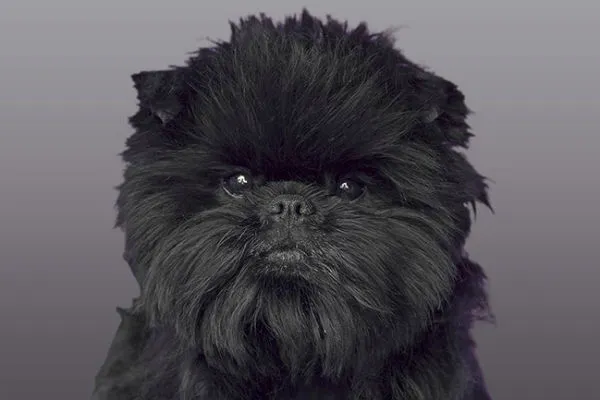 Affenpinscher with a wiry black coat looking alert and curious
Affenpinscher with a wiry black coat looking alert and curious
The Affenpinscher, whose name translates to “monkey-like terrier,” perfectly encapsulates this breed’s intelligent and mischievous nature. Despite their diminutive size, these Toy breed dogs possess a fearless demeanor and are incredibly alert, making them excellent watchdogs. A significant advantage for those seeking small lap dogs that don’t shed is the Affenpinscher’s wiry coat, which sheds very little and also boasts almost no “doggy” odor.
Their low-maintenance coat requires only twice-weekly brushing with a slicker brush and comb to keep them looking shaggy yet neat. Beyond their minimal shedding, Affenpinschers are known for their playful spirit and sense of humor, often amusing their owners with their antics. They thrive on companionship and generally do well in homes where they receive plenty of attention.
Basenji: The Barkless, Low-Shedding Hound
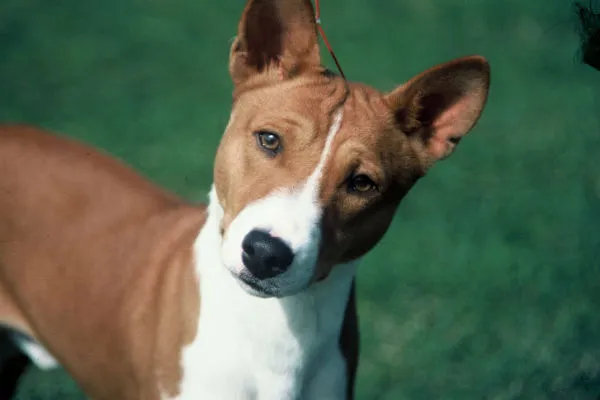 A sleek, short-haired Basenji in a tan and white coat sitting elegantly
A sleek, short-haired Basenji in a tan and white coat sitting elegantly
For enthusiasts of hounds who wish to avoid the typical hound odor and heavy shedding, the Basenji presents a compelling option among small lap dogs that don’t shed. This unique breed is famous for its almost barkless nature, instead communicating with a charming yodel-like sound. Basenjis shed very minimally, and their short, fine coat is remarkably easy to care for, requiring little more than an occasional brushing to remove loose hair.
Their quiet disposition makes them suitable for apartment living, provided they receive ample daily exercise and mental stimulation. Basenjis are intelligent and independent, sometimes described as cat-like in their grooming habits and aloofness. They form strong bonds with their families but can be reserved with strangers. For an active owner seeking a clean, quiet, and distinctly independent companion, the Basenji is an excellent choice.
Bichon Frise: The Playful Powder Puff
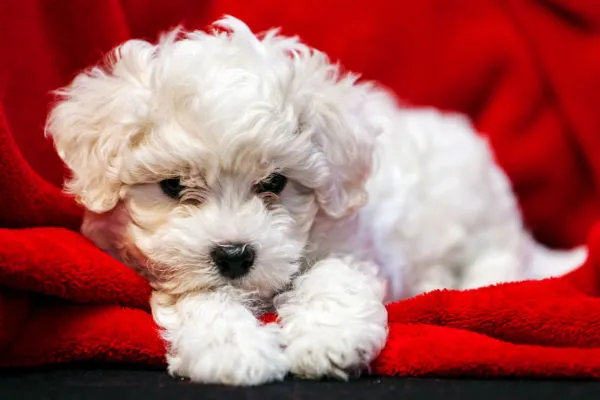 Fluffy white Bichon Frise with a playful expression, showcasing its powder-puff coat
Fluffy white Bichon Frise with a playful expression, showcasing its powder-puff coat
The Bichon Frise is truly a poster child for small lap dogs that don’t shed. Their soft, curly, double coat consists of hair that grows continuously, making them an ideal breed for people with allergies. However, “non-shedding” doesn’t mean “no maintenance.” These playful and affectionate dogs require frequent grooming, including daily brushing to prevent mats, and regular professional trims to maintain their signature powder-puff appearance.
Bichons are known for their cheerful and outgoing personalities, thriving on human interaction and generally getting along well with children and other pets. They are adaptable and can be content in various living situations, from apartments to larger homes, as long as they are part of the family activities. Their endearing nature and minimal shedding make them incredibly popular, but prospective owners must be prepared for the consistent grooming commitment.
Bolognese: A Calm, Fluffy Friend
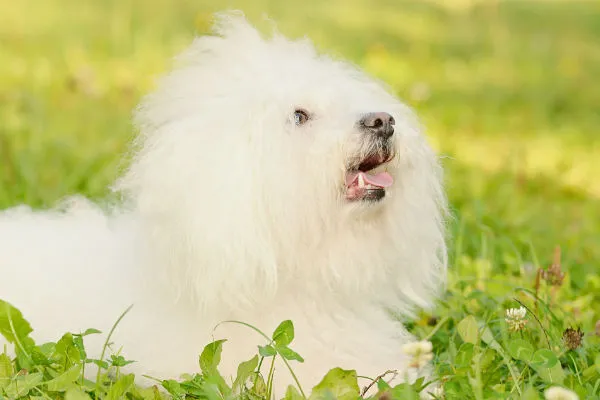 A small white Bolognese dog with a distinctive curly, non-shedding coat
A small white Bolognese dog with a distinctive curly, non-shedding coat
Closely related to the Bichon Frise, the Bolognese also boasts a distinctive fluffy coat composed of hair rather than fur, making them another excellent choice among small lap dogs that don’t shed. While they don’t shed in the traditional sense, their dead hair must be brushed out regularly to prevent tangles and mats. Daily grooming is essential to keep these lovable lap dogs looking their best.
Bolognese dogs are known for their calm, devoted, and somewhat reserved nature. They form strong bonds with their owners and are typically less boisterous than their Bichon cousins. They prefer a quiet home environment and thrive on companionship, making them wonderful pets for seniors or individuals seeking a gentle, affectionate indoor dog. Their manageable size and low shedding make them a fantastic option for apartment dwellers, provided they get moderate daily exercise.
Brussels Griffon: Small Dog, Big Personality
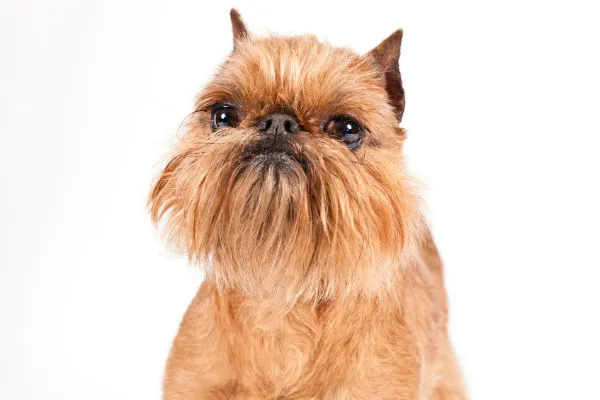 A scruffy-faced Brussels Griffon with a rough coat, looking intelligent and attentive
A scruffy-faced Brussels Griffon with a rough coat, looking intelligent and attentive
Despite their small stature, Brussels Griffons are far from dainty and are not dogs that require excessive pampering. They come in both smooth-coated (shed minimally) and rough-coated (virtually non-shedding) varieties, both thriving with regular grooming. The rough-coated type requires hand-stripping or professional grooming to maintain its texture and prevent matting, while smooth coats need less intensive care. This makes them a strong contender when considering small lap dogs that don’t shed.
These loyal and sensitive little dogs do best with families who are frequently home, as they crave companionship and can be prone to separation anxiety. Their small size means that daily walks and indoor play are usually sufficient to meet their exercise needs. Brussels Griffons are intelligent and can be trained, though they have a stubborn streak common in many toy breeds. Their expressive faces and confident attitudes make them captivating companions.
Chinese Crested: Elegance in Two Distinct Coats
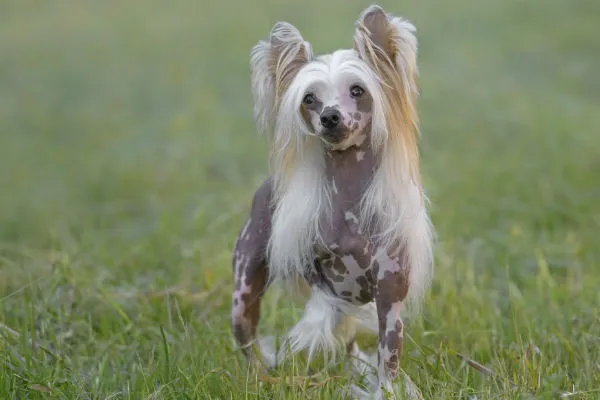 A Hairless Chinese Crested dog with tufts of hair on its head, tail, and paws
A Hairless Chinese Crested dog with tufts of hair on its head, tail, and paws
For those looking to entirely avoid shedding, the Hairless Chinese Crested offers a unique solution. This breed comes in two coat types: the Hairless, with hair only on its head (crest), tail (plume), and feet (socks), and the Powderpuff, which is covered with a soft, fine coat of hair that sheds very minimally. Both varieties are typically included in discussions of small lap dogs that don’t shed.
Hairless Chinese Crested require special skin care, including protection from the sun (sunscreen) and cold (clothing), and are prone to skin irritations if not properly cared for. The Powderpuff requires regular brushing to prevent matting. Cresteds are known for being affectionate, playful, and charmingly devoted to their families. They are typically good with children and other pets, making them adaptable companions, provided their unique grooming needs are met.
Coton De Tulear: The Royal Companion from Madagascar
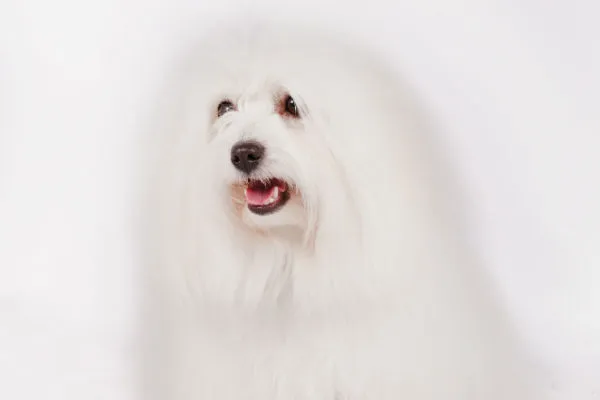 A long-haired, fluffy white Coton de Tulear with a gentle expression
A long-haired, fluffy white Coton de Tulear with a gentle expression
The Coton de Tulear, with its distinctive long, fluffy coat, is often described as feeling like cotton, hence its name. This beautiful coat is considered hypoallergenic, making the Coton an excellent choice for allergy sufferers and those searching for small lap dogs that don’t shed. While their coat doesn’t shed much, it does require daily grooming to prevent mats and keep it looking its best.
Cotons are known for their lighthearted, gentle, and affectionate natures. They are intelligent and easily trainable, eager to please their owners. Their playful yet calm demeanor makes them wonderful family pets, adapting well to various living situations, including apartments. They thrive on companionship and enjoy being involved in family activities, often showcasing a comical side that brings joy to their households.
Havanese: Cuba’s Charming Lap Dog
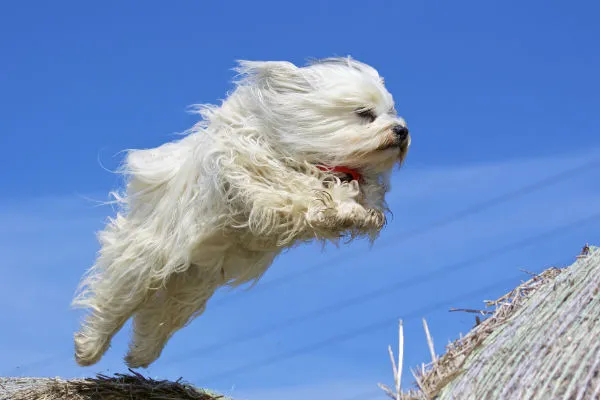 A playful Havanese with a long, silky coat and expressive eyes
A playful Havanese with a long, silky coat and expressive eyes
These charming dogs, native to Cuba, offer owners a patented spunky charm and a coat that doesn’t shed significantly, making them a popular choice among small lap dogs that don’t shed. Their non-shedding trait means less time spent cleaning up hair and more time romping with these playful companions. The Havanese’s silky double coat requires weekly brushing and regular baths to keep them clean, healthy, and free of mats. Many owners opt for a “puppy cut” to simplify grooming.
Havanese are intelligent, outgoing, and highly social dogs that thrive on human companionship. They are generally good with children, other pets, and strangers, making them excellent family dogs. Their playful and affectionate nature makes them ideal lap dogs, and they are quite adaptable to apartment living, provided they receive daily walks and playtime. For those seeking a lively yet manageable non-shedding friend, the Havanese is a superb option. You can find more specific guidance on small non-shedding dogs like the Havanese.
Lhasa Apso: The Lion Dog of Tibet
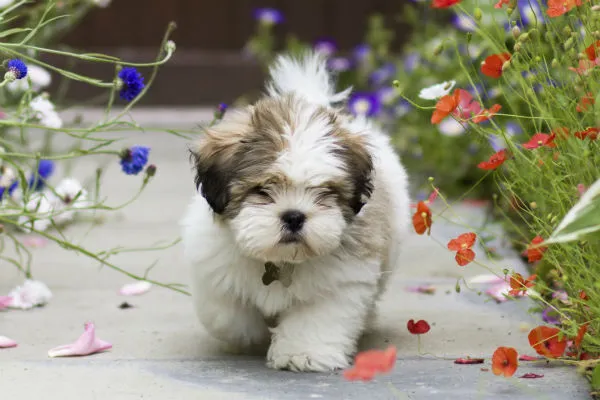 A Lhasa Apso with a long, dense coat and a calm demeanor
A Lhasa Apso with a long, dense coat and a calm demeanor
Originating from the snowy Himalayas of Tibet, the Lhasa Apso was historically bred as an indoor sentinel in monasteries and palaces. This small dog breed makes an excellent companion, known for its calm yet playful temperament. Lhasa Apsos are counted among small lap dogs that don’t shed, but their luxurious, floor-length double coat requires significant maintenance.
While they don’t shed, their long hair needs daily brushing to prevent mats. Many owners choose to keep their Lhasa Apsos in a shorter “puppy cut” to simplify grooming. They enjoy brisk walks and are equally content resting in their owner’s lap, embodying the true lap dog spirit. Lhasas are intelligent and independent, often forming strong bonds with their primary caregiver. They can be wary of strangers but are fiercely loyal to their families.
Maltese: The Ancient Lap Dog with Silky Hair
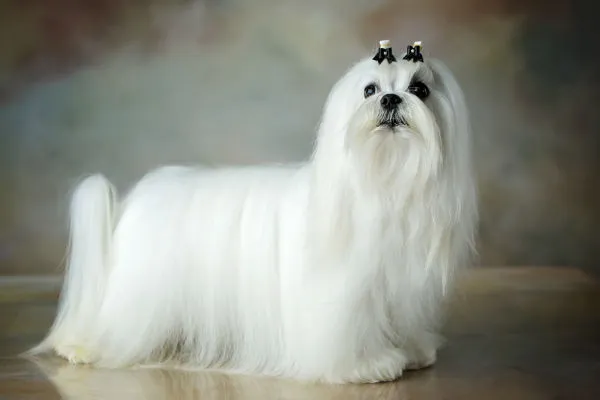 A graceful Maltese dog with long, flowing white hair looking charming
A graceful Maltese dog with long, flowing white hair looking charming
Maltese dogs have charmed humans for over three millennia, an ancient breed known for its distinctive long, flowing white coat. This captivating coat sheds very little, making the Maltese an ideal small lap dog that doesn’t shed for many households. Their elegant appearance requires regular grooming, including daily brushing to prevent mats and an occasional bath to keep their silky hair clean and vibrant.
Beyond their beauty, Maltese are known for their lively, playful, and affectionate personalities. They are intelligent and generally eager to please, making them responsive to training. Despite their regal appearance, they are sturdy little dogs who enjoy playtime and short walks. Their devotion and small size make them perfect apartment companions, thriving on close human contact.
Miniature Schnauzer: The Robust, Intelligent Terrier
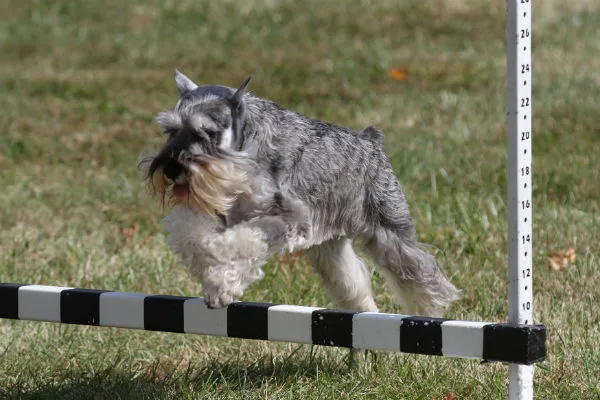 An alert Miniature Schnauzer with its distinctive beard and intelligent eyes
An alert Miniature Schnauzer with its distinctive beard and intelligent eyes
The Miniature Schnauzer is a smart, trainable, and cheerful little dog that strongly resembles its Standard Schnauzer cousin but in a more compact package. This Terrier breed sheds very little, making it a popular choice for those seeking small lap dogs that don’t shed. Their wiry double coat needs weekly brushing and regular professional grooming (clipping or hand-stripping) to maintain its characteristic appearance and health.
Miniature Schnauzers are known for their lively and outgoing personalities, combined with an alert and protective nature. They are highly adaptable, equally at home in a city apartment or a country dwelling, as long as their human companions are nearby. Their intelligence makes them easy to train, and they excel in various dog sports. They are robust, spirited, and loyal companions that bring energy and character to any home. Looking for dog breeds that don’t shed hair? The Miniature Schnauzer is a top contender.
Poodle (Toy & Miniature): The Quintessential Hypoallergenic Breed
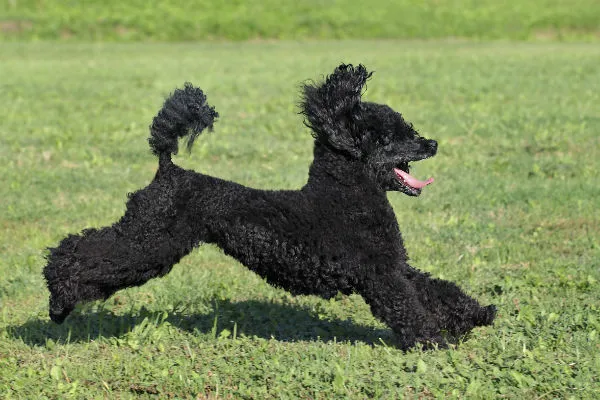 A perfectly groomed Poodle with a curly coat, often seen in miniature or toy sizes
A perfectly groomed Poodle with a curly coat, often seen in miniature or toy sizes
When people think of small lap dogs that don’t shed, Poodles are often the first breed that comes to mind, and for good reason. Miniature and Toy Poodles offer these desirable qualities in petite, intelligent packages, sharing the same non-shedding and hypoallergenic traits as their larger Standard counterparts. Their signature curly coat, which is more like hair, traps loose fur and dander, making them excellent for allergy sufferers.
Poodles are renowned for their exceptional intelligence, making them highly trainable and quick learners. They are active, proud, and playful dogs that thrive on mental and physical stimulation. While they don’t shed, their dense, curly coat requires consistent professional grooming every 4-8 weeks, along with regular brushing at home, to prevent matting. Their versatility, intelligence, and low-shedding nature make them one of the most beloved non-shedding small breeds.
Scottish Terrier: The Bold and Independent Scottie
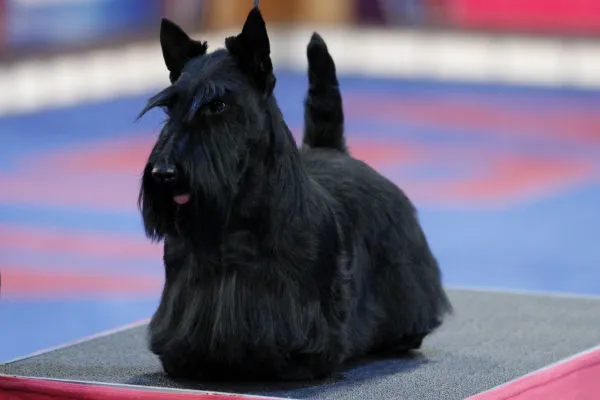 A black Scottish Terrier with a bold stance and a wiry coat
A black Scottish Terrier with a bold stance and a wiry coat
The Scottish Terrier, affectionately known as the Scottie, is a Terrier breed celebrated for its boldness, confidence, and distinctive personality. Their wiry, weather-resistant double coat sheds very little, solidifying their place among small lap dogs that don’t shed. To keep their coats healthy and maintain their classic outline, Scotties require regular brushing, grooming, and occasional hand-stripping.
Scotties are clever, independent, and notoriously feisty dogs with a strong prey drive. This means owners must be mindful around smaller animals. While they are loyal and devoted to their families, they can be reserved with strangers and benefit from early socialization. Their compact size makes them suitable for various living situations, and their moderate energy levels are satisfied with daily walks and play. For those who appreciate a dog with character and minimal shedding, the Scottie is an excellent choice.
Shih Tzu: The Regal “Lion Dog”
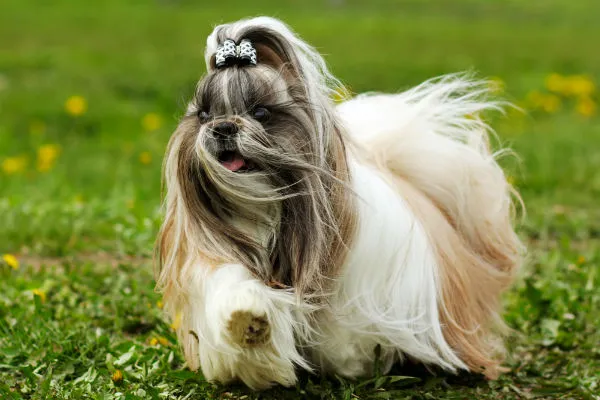 A regal Shih Tzu with long, flowing hair and a proud expression
A regal Shih Tzu with long, flowing hair and a proud expression
The Shih Tzu is another breed with a long and storied pedigree, historically favored as house pets of the Tang Dynasty in China. These “little lion dogs” come in a variety of colors and patterns, and their long, silky hair is very low-shedding, making them a quintessential small lap dog that doesn’t shed. Their magnificent coat looks exceptionally regal when brushed out, befitting their royal ancestry.
Bred specifically to be house pets and cherished companions, Shih Tzus are sturdy and lively, with a carriage often described as arrogant due to their proudly held heads and curling tails. Their gentle, trusting, and outgoing nature makes them exceptional companions, thriving on attention and affection. Daily brushing is essential to prevent tangles in their long coats, or many owners opt for a practical “puppy cut.” Shih Tzus are generally good with children and other pets, making them fantastic family members.
West Highland White Terrier: The Spirited Westie
![]() A cheerful West Highland White Terrier with its iconic white, coarse coat
A cheerful West Highland White Terrier with its iconic white, coarse coat
The coarse, bright white hair of the West Highland White Terrier, affectionately known as Westies, sheds very little, making them a popular choice among small lap dogs that don’t shed. This sturdy little dog is intelligent, loyal, happy, and highly entertaining. Their coat requires regular brushing and occasional professional grooming (hand-stripping or clipping) to maintain its health and characteristic texture.
Westies are curious dogs with moderate energy levels and a spirited, independent streak common among Terriers, which can sometimes make training a delightful challenge. They are alert, confident, and enjoy being part of family activities. While adaptable to various living situations, they benefit from daily exercise and mental stimulation. Their cheerful disposition and low-shedding coat make them wonderful companions for active families.
Xoloitzcuintli: The Ancient Mexican Hairless
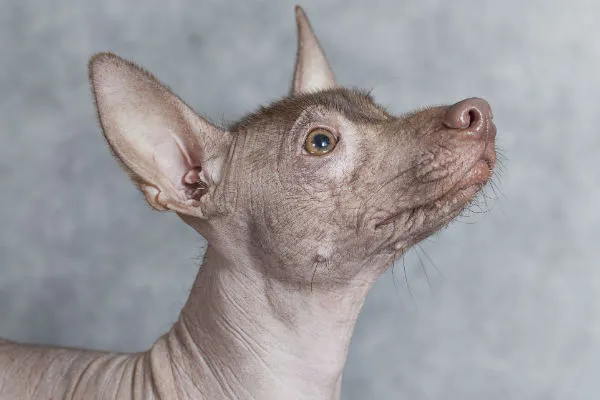 A hairless Xoloitzcuintli, also known as the Mexican Hairless dog, with smooth skin
A hairless Xoloitzcuintli, also known as the Mexican Hairless dog, with smooth skin
Also known as the Mexican Hairless dog, the Xoloitzcuintli is an ancient and rare breed that comes in both hairless and coated varieties. Both types are considered among small lap dogs that don’t shed, or shed minimally. Hairless Xolos retain a small amount of hair on their heads, while the coated variety has a very short, fine coat that sheds minimally.
As with any hairless breed, the Xolo needs extra attention when it comes to skin care to protect them from the elements; sunscreen is essential in sunny weather, and clothing is needed in cold climates. Xolos make attentive watchdogs and affectionate companions. While they enjoy physical activities like walks and vigorous play, they are also well known for their tranquil and calm personality around the home, thriving on close family bonds. Their unique appearance and minimal shedding make them a truly distinctive choice.
Yorkshire Terrier: The Sprightly and Affectionate Yorkie
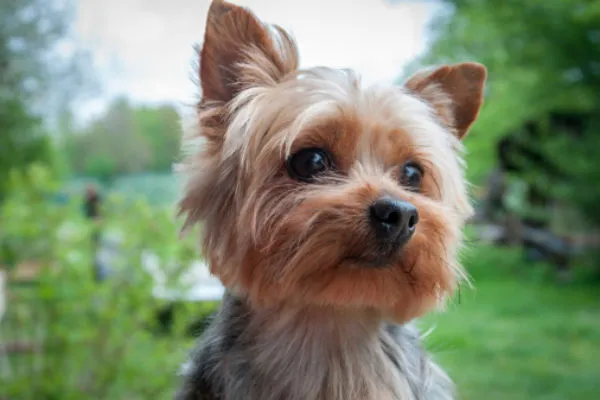 A lively Yorkshire Terrier with a silky coat and a confident personality
A lively Yorkshire Terrier with a silky coat and a confident personality
Sprightly, tomboyish, and undeniably affectionate, the Yorkshire Terrier, often called the Yorkie, is a Toy breed brimming with personality. These spunky lap dogs are incredibly popular, and for good reason: Yorkshire Terriers do not shed. Their long, silky coats are beautiful when brushed out daily, a task made easy by their small size. This makes them a prime example of small lap dogs that don’t shed and are also good family companions.
Don’t be fooled by their regal carriage – Yorkies have working-class roots, originally hunting rats in English clothing mills. Today, they are just as happy to sit on their owner’s lap as they are exploring. Their confidence, intelligence, and unwavering loyalty make them wonderful companions, though they often have a “big dog” attitude in a tiny package. Consistent grooming is key to preventing mats in their rapidly growing hair.
Beyond the List: Choosing Your Perfect Non-Shedding Companion
Selecting a small lap dog that doesn’t shed is an exciting endeavor, but remember that minimal shedding doesn’t equate to zero maintenance. Each breed has unique needs regarding grooming, exercise, training, and temperament. Taking the time to carefully research these non-shedding dog breeds will help you find the dog that best matches your lifestyle and personality.
Always consider the commitment involved in bringing a dog into your life. To avoid health problems, always strive to purchase a dog from a reputable and responsible breeder who prioritizes the health and temperament of their puppies. Provide your dog with a high-quality, balanced diet, ensure they receive regular veterinary checkups, and shower them with love and consistent training. By doing so, you’ll welcome a happy, healthy, and hair-free companion into your home for many years to come.
